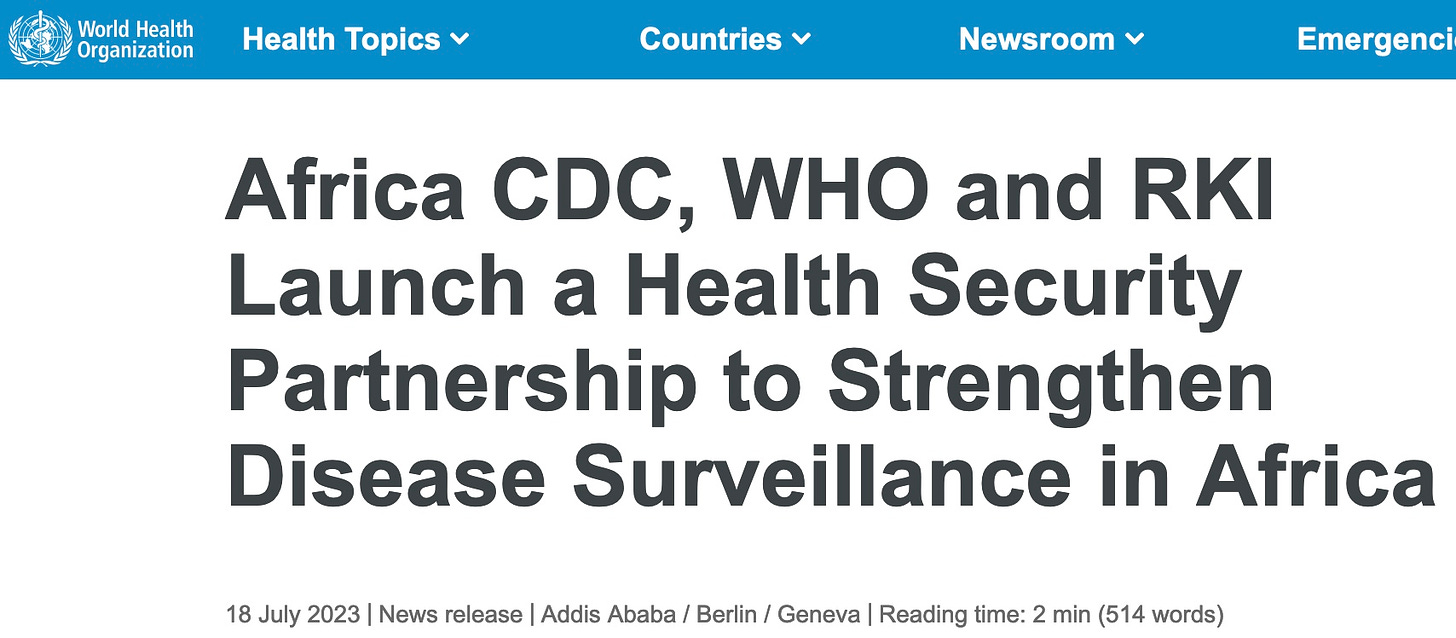The Global Biosecurity Agenda a.k.a. International Pandemic Preparedness is not coming; it is already here, growing, and expanding into Africa
But at the end you see it is funded by the military and it is not about your health
The Biosecurity Agenda Has Come to Africa already. You see, the globalists didn’t wait for the Treaty and Amendments to pass: they have been installing the biosecurity network quietly, relentlessly, for years, using your tax dollars.
The Africa Centres for Disease Control and Prevention (Africa CDC), the World Health Organization (WHO) and the Robert Koch Institute (RKI) today launched a Health Security Partnership to Strengthen Disease Surveillance and Epidemic Intelligence in Africa. The partnership aims to strengthen Africa’s health security capabilities in the areas of biosecurity, integrated disease surveillance, event-based surveillance, genomic surveillance, and epidemic intelligence. The partnership seeks to encourage strong country leadership. The first phase will be implemented in six African Union Member States including The Gambia, Mali, Morocco, Namibia, Tunisia, and South Africa and will later be expanded to additional countries.
Strengthened disease surveillance is a foundational requirement for health security. [The swabs and PCR tests are coming back—Nass] Substantial progress has been made in disease surveillance across Africa over the past decade, but it is worth noting that it experiences more outbreaks and other health emergencies than others, many of which are preventable or controllable with proven public health interventions. [Except we have not seen much success.]The COVID-19 pandemic highlighted the critical role of the public health laboratory in surveillance as well as the necessity for advancements in data collection, management, reporting, and dissemination to ensure evidence-based policy making during health security emergencies.
In response, the Health Security Partnership in Africa works to improve integrated disease surveillance capabilities across the continent in order to better detect, confirm, and notify health security threats. "The multi-country project consultation and launch meeting is a significant milestone towards strengthening surveillance and epidemic intelligence capabilities in Africa. It provides a platform for sharing experiences and best practices, which will be essential for the success of the project," said Dr. Yenew Kebede, Head of Laboratory Systems and Networks at Africa CDC.
With a shared commitment in supporting African countries to strengthen health systems and safeguard public health, WHO’s Regional Offices for Africa and the Eastern Mediterranean have been working closely with Africa CDC under the Joint Emergency Action Plan (JEAP) framework to strengthen public health surveillance, promote regional cooperation, and address health challenges in Africa. The Health Security Partnership in Africa will contribute to the overall collaborative framework by delivering concrete results in the areas of emergency preparedness and response, surveillance and laboratory capabilities, and help protect the health of people in Africa through a better coordinated and more resilient health system.
“Our collective ability to prevent, prepare for, and respond [No evidence anyone knows how to do this but it sure sounds good] to healthy security emergencies remains critical to keeping our communities safe,” said Sara Hersey, Director of Collaborative Intelligence at the WHO Hub for Pandemic and Epidemic Intelligence. “Through this partnership, WHO remains dedicated to working with Member States to systematically strengthen our capabilities and collaboration across stakeholders, sectors and borders for more effective and collaborative disease surveillance in Africa.”
Funded by the Government of Canada’s Weapons Threat Reduction Program and aligned with the health security objectives of the G7-led Global Partnership Against the Spread of Weapons and Materials of Mass Destruction, the Health Security Partnership in Africa signifies a collective commitment to collaboration at the health security interface and will play a catalytic role in accelerating the building and pooling of capabilities and expertise for disease surveillance and epidemic intelligence in and for Africa.
[At least in this last paragraph they tell you this is a military operation and not a health operation—Nass]





They killed 3 leaders to get in there. I’m sure Africans are shaking in their boots once again. Africa needs to be liberated once and for all.
Notice that the phrase "health security" appears 10 TIMES in the article. Even five years ago, you would not have found these two words even in the same sentence.
Seeing these two words paired like this causes me distinct unease and distrust. (I wonder why?....)